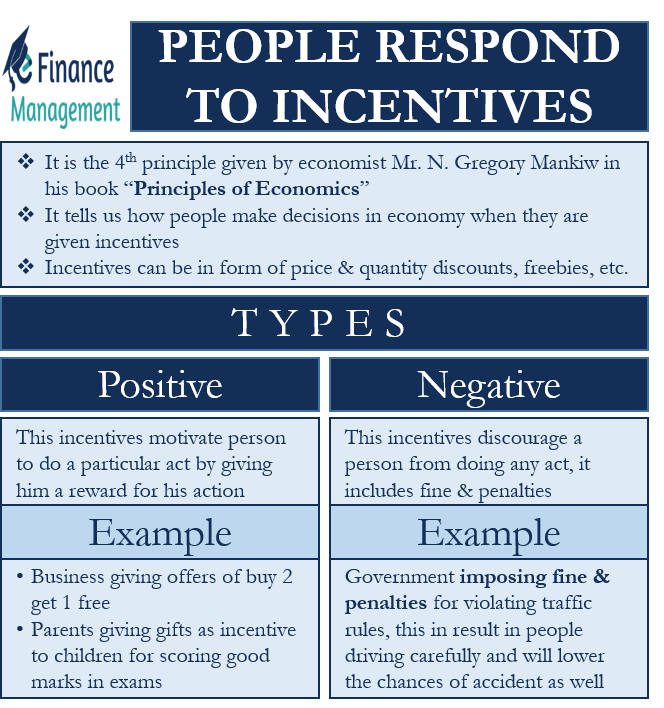What is Principle 4: People Respond to Incentives?
Eminent economist Mr. N. Gregory Mankiw gave us ten principles of economics in his famous book “Principles of Economics.” “Principle 4: People respond to incentives” is the fourth principle out of the ten principles. It tells us how people make decisions in an economy when they are given incentives. Incentives motivate a person to do a particular act by giving him a reward for his action. There are negative incentives that are given to discourage a person from doing any act, and they may include punishments or fines and penalties for the same.
We assume that people are rational in an economy. They compare the costs and benefits of any act logically. Hence, they will act in a positive manner if they are provided with incentives to do that activity. Incentives can be in the form of price and quantity discounts, freebies, etc., while buying a product or service. Incentives have the power to affect buying and investment decisions significantly. They can even alter the consumption pattern in an economy. Due to this reason, incentives have taken center stage in economics. They guide all the activities in an economy. All the market participants, be it manufacturers, consumers, suppliers, or even the governments- are affected by incentives.
How do People Respond to Incentives?
Rational people usually respond positively to incentives. On a micro level, a simple example can be parents giving incentives of gifts to their child if he performs well in his exams. The incentive motivates the child to devote more time to his studies and study hard. He becomes more sincere in his effort to score more. Thus, incentives can bring positive behavioral change in people.
On the macro level, incentives also decide the movement of the markets. They influence the consumption pattern, which in turn influences the production and employment pattern in an economy. Let us understand this with the help of an example.
Also Read: Ten Principles of Economics
Suppose that a shirt manufacturer comes up with a scheme of giving one shirt free with every two shirts that a customer purchases. Customers instantly grab the offer. A customer who wanted to buy one shirt is now buying two shirts and getting one shirt free. In total, he is taking away three shirts. In addition to this, the overall demand also increases with the shifting of new customers from other brands to this shirt brand because of the incentives.
The manufacturer increases its production levels because of higher demand. He employs more workers to make more shirts and cope with the increased demand. Therefore, we see that a decision to provide incentives on the shirts resulted in a change in the production pattern. It also has a direct positive effect on employment numbers as well.

Negative Incentives
People also respond to incentives (in the way of punishments). Governments and authorities generally use this type of incentive. They may have socio-economic benefits in a few cases. Suppose the government comes up with a law to impose a fine of $1000 on serial offenders caught violating the traffic rules five times or more in a year. Now, this is a negative incentive and will act as a deterrent for people who drive recklessly. They will change their driving behavior and be more cautious in following the traffic rules.
The number of road accidents will gradually decrease as people drive more carefully, resulting in fewer deaths and casualties. Thus, such negative incentives can sometimes be good for society as a whole. They can have direct as well as indirect effects and can help in changing the behavior of the general public in a positive way.
Also Read: Principle 1: People face Trade-offs
Summary
“Principle 4: People respond to incentives” is a principle with universal validity. Incentives act as a motivational force for any rational person across the world. From children to grown-ups, incentives touch the lives of one and all.
The billionaire American investor Charlie Munger once said, “Show me the incentive, and I will show you the outcome.” Incentives give the required push to people to work harder, invest more, and optimally utilize the limited resources available to them to achieve the highest levels of satisfaction.
RELATED POSTS
- Principle 6: Markets are Usually a Good Way to Organize Economic Activity
- Friedman Doctrine – Meaning, Importance, Criticism and More
- Theory of Demand – Meaning, Demand Curve, Exception, and Graph
- Incentive Contract: Meaning, Types, Advantages, Disadvantages and More
- Principle 5: Trade can make everyone better off
- Principle 3: Rational People Think at the Margin

